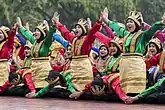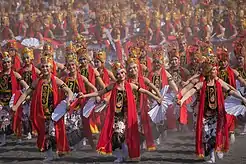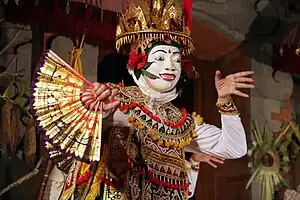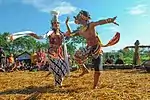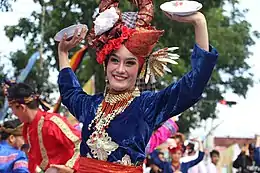 Performance of janger dance | |
| Native name | ᬚᬗᬾᬃ (Balinese) Tari Janger (Indonesian) |
|---|---|
| Instrument(s) | Gamelan, Kendhang |
| Inventor | Balinese and Osing |
| Origin | Indonesia |
| Janger dance |
|---|
|
| Burma |
| Cambodia |
| Indonesia |
|
| Laos |
| Malaysia |
| Philippines |
| Thailand |
|
| Vietnam |
Janger (Balinese: ᬚᬗᬾᬃ) is a traditional Balinese and Osing dance drama performance originated from the Indonesian island of Bali,[1] and commonly performed by Balinese in Bali as well as Osing people in the easternmost region of Java. The term roughly translates to '"infatuation," with a connotation of someone who is madly in love" [2]:97
History
Janger is a social dance created in the 1920s, though its exact date of origin is unknown[3]:17, 161 I Madé Kredek claims it 'originated in the village of Menyali, North Bali and the songs featured in it were those of the horse drivers in the area.'[2]:101
Performance
Janger is a 'flirtatious youth group dance';[4]:92 it begins with a tableau vivant and a welcoming song.[3]:161 This is followed by 12 male dancers (kecak) who perform an elaborate routine; when finished, they sit in two rows of six facing each other, and a female group (janger) enters and sings a traditional folk song,[3]:161 and perform a slower dance with an 'emphasis on fluid, undulating, arm movements'[2]:100 When finished they form two lines of six, with the male dancers 'forming a boundary around the playing area.'[3]:161 This opening is followed by a drama, which usually concerns some sort of domestic theme.[3]:162
Gallery
 Janger dancers
Janger dancers Janger performance
Janger performance Janger performance, back view
Janger performance, back view
See also
References
- ↑ Kartika Dewi Suardana (2012). Dances of Bali. PT. Phoenix Communications. ISBN 978-60-297-9711-4.
- 1 2 3 Bandem, Deboer; Bandem, I. Made; DeBoer, Fredrik Eugene (1995). Balinese Dance in Transition: Kaja and Kelod. Oxford University Press. ISBN 978-967-65-3071-4.
- 1 2 3 4 5 Connick, Rob (2011). Rethinking Artaud's Theoretical and Practical Works (Thesis). Bowling Green State University.
- ↑ Sedana, I Nyoman; Foley, Kathy (2016-02-05). "Traditional Indonesian Theatre". In Liu, Siyuan (ed.). Routledge Handbook of Asian Theatre. Routledge. ISBN 978-1-317-27886-3.
.svg.png.webp)

